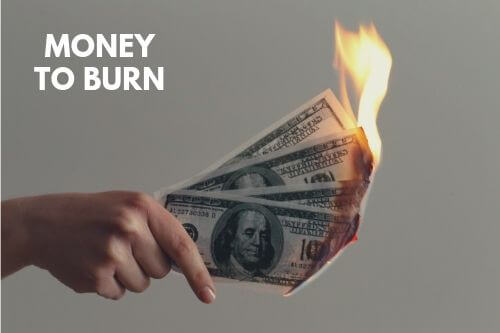
YouTube / iTunes / Spotify / Radio Public / Pocket Casts / Google Podcasts / Breaker / Overcast
Listen to ArtisanEnglish.jp posts & lesson intros here.
Idiom: Money to burn
Writing a blog post every day is challenging.
Often, it helps to write about experiences that I have had.
This time, I will write about something I’ve never had: money to burn.
If you have money to burn, you spend a lot on unnecessary things.
It doesn’t mean you’re filthy rich.
People may think you’re wealthy and have money to burn, but they don’t see your credit card bills.
From the standpoint of a Japanese person in Japan, Americans seem to have money up the ying-yang.
They see the big cars, large recreational vehicles, personal jets and mansions by the lake and believe Americans have lots and lots of money.
In some cases, that may be true, but what they don’t see is that along with all the toys come lots and lots of bills.
American culture and Canadian culture are centred around the bigger-better-faster-more-give-it-to-me-now way of thinking.
Very few of us have the patience required to save money and pay for things in cash.
We work hard the same as everybody else and feel we deserve to reward ourselves.
Whatever we want, we get it now and worry about paying for it later.
These characteristics of North American life create the illusion of having money to burn.
What the Japanese don’t realize is that selling private jets may be lucrative, but repossessing them is almost just as profitable.
Americans may seem like they have money to burn, but the only thing burning is the candle – at both ends.
Very few people in this world have money to burn.
Most rich and famous people who live high-flying lifestyles barely have enough time to enjoy everything they have.
The reason is they’re too busy working to pay for it all.
Flesch-Kincaid Readability Test
This post is understandable by someone with at least an 8th-grade education (age 13 – 14).
On the Flesch-Kincaid reading-ease test, this post scores 68.
The easier a passage is to read, the higher the score on a scale of 0 – 100.

